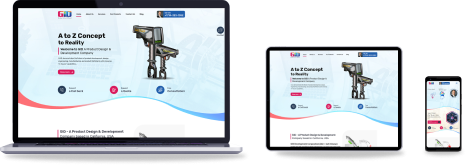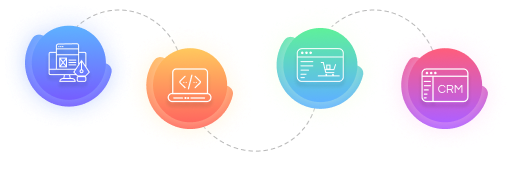
The Ultimate Guide to Custom CRM Development for Small Businesses
In today’s competitive business landscape, managing customer relationships effectively can be the difference between success and failure, especially for small businesses. As small enterprises strive to grow and thrive, having a robust system to handle customer interactions, sales, and service becomes increasingly crucial. This is where Custom CRM Development comes into play.
Custom CRM Development involves creating a personalized Customer Relationship Management (CRM) system tailored specifically to meet the unique needs of a business. Unlike off-the-shelf CRM solutions, which offer a one-size-fits-all approach, custom CRMs are designed from the ground up to align with your company’s processes, goals, and challenges. This bespoke approach ensures that every aspect of the CRM system supports and enhances your business operations, leading to greater efficiency and better customer relationships.
In this ultimate guide, we will explore why Custom CRM Development is particularly beneficial for small businesses and how it can be a game-changer for your growth. We’ll delve into the key advantages, the steps involved in a custom CRM development, and how partnering with a seasoned provider like Concept Infoway can elevate your CRM system to new heights. Whether you’re considering a CRM for the first time or looking to replace an existing system, this guide will provide you with the insights you need to make informed decisions.
Chapter 1: Understanding Custom CRM Development
What is Custom CRM Development?
Custom CRM Development refers to the process of designing and building a CRM system that is tailored specifically to the needs and requirements of a particular business. Unlike standard CRM solutions that offer a fixed set of features and functions, custom CRMs are crafted to address the unique workflows, processes, and challenges faced by a business. This bespoke approach ensures that the CRM system is perfectly aligned with the business’s operations and goals.
Custom CRM vs. Off-the-Shelf CRM
- Off-the-Shelf CRM: These are pre-built systems designed to cater to a broad range of businesses. While they offer a quick and often cost-effective solution, they may lack the specific features or integrations that a business needs. Customization options are usually limited, which can result in a system that doesn’t fully support the business’s unique processes.
- Custom CRM Development: This approach involves creating a CRM system from scratch or extensively modifying an existing system to suit a business’s specific requirements. It offers the advantage of complete alignment with the business’s workflows, processes, and strategic objectives. Custom CRMs can integrate seamlessly with other business tools and provide a more intuitive user experience.
Benefits of Custom CRM Development
- Personalization and Customization
- Tailoring Features to Specific Needs: Custom CRM systems are designed to incorporate the exact features and functionalities required by your business. This means you get a CRM that works the way you do, without unnecessary features or limitations.
- Enhancing User Experience: By focusing on your business’s specific needs, a custom CRM provides a more intuitive and user-friendly interface, making it easier for your team to adapt and utilize the system effectively.
- Scalability
- Adapting to Business Growth: As your business grows, so will your CRM needs. Custom CRMs are built with scalability in mind, allowing for easy expansion and integration of new features as your business evolves.
- Integration
- Seamless Integration with Existing Tools: Custom CRMs can be designed to integrate smoothly with other tools and software that your business uses, such as accounting systems, email platforms, and marketing automation tools. This ensures a cohesive and streamlined workflow.
- Data Security
- Ensuring Secure Handling of Customer Data: Custom CRMs can be equipped with robust security features tailored to your business’s specific data protection needs, ensuring that sensitive customer information is handled securely and in compliance with relevant regulations.
Chapter 2: Key Benefits of Custom CRM Development for Small Businesses
Custom CRM Development provides numerous advantages, especially for small businesses striving to enhance their customer management and operational efficiency. Here’s a closer look at the key benefits:
Personalization and Customization
Tailoring Features to Specific Business Needs
One of the most compelling benefits of Custom CRM Development is its ability to cater specifically to your business’s needs. Off-the-shelf CRMs often come with a generic set of features that may not align perfectly with your workflows. A custom CRM, on the other hand, is built from the ground up to include functionalities that directly address your unique business processes.
For example, if your business requires a specialized sales pipeline or customer support module, a custom CRM can be designed to incorporate these features precisely as needed. This ensures that your team can work more efficiently, with a system that supports their day-to-day activities without unnecessary complexity.
Enhancing User Experience and Adoption Rates
A CRM system that is tailored to your business will be more intuitive and user-friendly for your team. When employees interact with a system that fits their workflow, they are more likely to embrace it fully. Custom CRMs offer the flexibility to design interfaces and functionalities that align with how your staff works, making the transition smoother and enhancing overall productivity.
Scalability
Adapting to Business Growth
As your small business grows, your CRM needs will evolve. Custom CRM systems are designed with scalability in mind, meaning they can expand and adapt to accommodate your business’s growth. Whether you need to add new users, incorporate additional features, or integrate with new tools, a custom CRM can be adjusted to meet these changing requirements.
This scalability ensures that you won’t outgrow your CRM system as your business expands, providing a long-term solution that continues to support your evolving needs.
Integration
Seamless Integration with Existing Tools and Software
Another significant advantage of Custom CRM Development is its ability to integrate seamlessly with other business tools and software. Off-the-shelf CRMs may offer limited integration options, leading to potential inefficiencies and data silos. In contrast, a custom CRM can be designed to work harmoniously with your existing systems, such as accounting software, email platforms, and marketing tools.
This integration ensures that data flows smoothly between systems, reducing the need for manual data entry and minimizing the risk of errors. By connecting your CRM with other tools, you create a unified system that enhances overall operational efficiency.
Data Security
Ensuring Secure Handling of Customer Data
Data security is a critical concern for any business. Custom CRM Development allows you to implement robust security features tailored to your specific needs. Unlike off-the-shelf solutions, which may have generalized security measures, a custom CRM can be designed to meet your business’s particular data protection requirements.
This includes implementing advanced encryption, access controls, and compliance with relevant regulations. By prioritizing data security, you safeguard sensitive customer information and build trust with your clients.
Chapter 3: Steps to Successful Custom CRM Development
Embarking on a Custom CRM Development project involves several key steps to ensure a successful outcome. Here’s a comprehensive guide to navigating the development process:
Needs Assessment
Identifying Business Requirements
The first step in Custom CRM Development is to thoroughly assess your business needs. This involves gathering input from key stakeholders, such as sales teams, customer service representatives, and management, to understand their specific requirements and pain points.
A detailed needs assessment helps in defining the features and functionalities that your custom CRM must include. This phase is crucial for ensuring that the final product aligns with your business goals and enhances operational efficiency.
Consulting with Stakeholders
Engage with various departments and users within your organization to gather their insights and expectations. This collaborative approach ensures that the custom CRM addresses the needs of all relevant stakeholders and fosters greater acceptance of the system once it is implemented.
Choosing the Right Development Partner
Importance of Selecting an Experienced Provider
Selecting a reliable and experienced development partner is vital for the success of your Custom CRM project. Concept Infoway, a leader in CRM development, offers the expertise and experience needed to create a tailored solution that meets your business’s unique needs.
An experienced provider like Concept Infoway will guide you through the entire development process, from initial consultation to final deployment, ensuring that your CRM system is built to the highest standards of quality and functionality.
Case Studies and Success Stories
Consider reviewing case studies and success stories from Concept Infoway to understand how they have successfully delivered custom CRM solutions for other businesses. These examples can provide valuable insights into their approach and the results you can expect from partnering with them.
Design and Development
Prototyping and Wireframing
Once the requirements are defined, the design phase begins. This involves creating prototypes and wireframes to visualize the layout and functionality of the CRM system. Prototyping allows you to review and refine the design before development begins, ensuring that the final product meets your expectations.
Agile Development Process
An agile development approach involves iterative development and regular feedback. This methodology allows for continuous improvements and adjustments based on user feedback, ensuring that the CRM system evolves to meet your needs throughout the development process.
Testing and Quality Assurance
Importance of Thorough Testing
Thorough testing is essential to ensure that your custom CRM system is reliable and functions as intended. This phase includes various types of testing, such as functionality testing, performance testing, and security testing, to identify and resolve any issues before deployment.
Involving End-Users in the Testing Phase
Engaging end-users in the testing phase provides valuable insights into the system’s usability and effectiveness. Their feedback helps in identifying any usability issues and ensures that the CRM system is user-friendly and meets the needs of those who will be using it daily.
Deployment and Training
Smooth Transition and User Training
The deployment phase involves rolling out the CRM system to your organization. A well-planned deployment strategy ensures a smooth transition with minimal disruption to your business operations.
Training is a crucial component of this phase. Providing comprehensive training for your staff ensures they are familiar with the new system and can use it effectively from day one. Concept Infoway often provides training and support services to help businesses transition seamlessly to their new CRM system.
Ongoing Support and Maintenance
After deployment, ongoing support and maintenance are essential for addressing any issues that may arise and for implementing updates and improvements. Partnering with a development provider like Concept Infoway ensures that you have access to continued support and expertise as you navigate the evolving needs of your business.
By following these steps, you can ensure a successful Custom CRM Development project that delivers a tailored solution to enhance your business operations and customer management.
Chapter 4: Overcoming Common Challenges in Custom CRM Development
Even though Custom CRM Development offers numerous advantages, there are several challenges that small businesses might face during the process. Understanding these challenges and knowing how to address them can significantly improve the outcome of your CRM project.
Budget Constraints
Cost-Effective Strategies for Small Businesses
Custom CRM Development can sometimes be perceived as expensive, especially for small businesses with limited budgets. However, there are ways to manage costs effectively. Start by prioritizing essential features and functionalities that directly address your business needs.
Additionally, consider phased development, where you launch the CRM with core features and gradually add more advanced functionalities as your budget allows. Working with an experienced provider like Concept Infoway can help in optimizing the budget by providing cost-effective solutions and transparent pricing.
Time Management
Setting Realistic Timelines
Time management is crucial for the successful implementation of a custom CRM system. Developing a custom CRM requires careful planning and coordination, which can sometimes lead to delays. To mitigate this, set realistic timelines and establish clear milestones throughout the project.
Regularly communicate with your development team to ensure that the project stays on track. An experienced partner like Concept Infoway can provide a structured timeline and keep you informed about progress, ensuring timely delivery of the CRM system.
User Adoption
Encouraging Staff to Embrace the New System
One of the biggest challenges in CRM implementation is ensuring that your team adopts the new system. Change can be difficult, and staff may be resistant to using a new CRM if they are not adequately prepared.
To address this, involve your team early in the process and gather their input during the development phase. Providing thorough training and ongoing support will also help ease the transition. Concept Infoway often includes user training as part of their services to ensure that employees are comfortable and proficient with the new system.
Data Migration
Ensuring Smooth Data Transfer from Old Systems
Migrating data from existing systems to a new custom CRM can be complex and risky. It’s crucial to plan and execute the data migration process carefully to avoid data loss or inconsistencies.
Work with your development team to establish a clear data migration plan, including data mapping, cleansing, and validation. Concept Infoway can assist with data migration to ensure a smooth transition and the integrity of your data.
Chapter 5: Maximizing ROI with Custom CRM Development
Investing in a Custom CRM system is a significant decision, and it’s essential to ensure that you maximize your return on investment (ROI). Here’s how to achieve this:
Measuring Success
Key Performance Indicators (KPIs) to Track
To measure the effectiveness of your custom CRM system, establish key performance indicators (KPIs) that align with your business goals. Common KPIs include:
- Customer Acquisition Cost (CAC): Measures the cost of acquiring a new customer.
- Customer Retention Rate: Tracks the percentage of customers who remain loyal over time.
- Sales Conversion Rate: Measures the percentage of leads that convert into paying customers.
- Customer Satisfaction Scores: Gauges how satisfied your customers are with your service.
Regularly monitor these KPIs to assess the CRM’s impact on your business and make data-driven decisions for further improvements.
Continuous Improvement
Regular Updates and Feature Enhancements
A successful CRM system is one that evolves with your business. Regularly review and update your CRM to incorporate new features, address emerging needs, and adapt to changes in the market.
Work with your development partner to schedule periodic reviews and enhancements. Concept Infoway offers ongoing support and maintenance to help you keep your CRM system up-to-date and aligned with your business objectives.
Leveraging Analytics
Using CRM Data to Drive Business Decisions
One of the greatest benefits of a custom CRM system is the ability to collect and analyze data that can drive strategic decisions. Use CRM analytics to gain insights into customer behavior, sales trends, and operational efficiency.
Analyze data to identify opportunities for improvement, optimize marketing strategies, and enhance customer service. By leveraging CRM data effectively, you can make informed decisions that drive growth and improve overall business performance.
Conclusion
In this guide, we’ve explored the benefits and process of Custom CRM Development for small businesses. We discussed how a custom CRM system can provide personalized solutions, enhance scalability, integrate seamlessly with existing tools, and ensure robust data security.
We also outlined the steps involved in successful CRM development, from needs assessment and choosing the right development partner to deployment and ongoing support.
Investing in a custom CRM system is a strategic decision that can significantly impact your business’s growth and efficiency. By tailoring the CRM to your specific needs, you create a powerful tool that supports your unique processes and enhances customer relationships.
If you’re ready to take your customer management to the next level, consider partnering with Concept Infoway. Their expertise in Custom CRM Development ensures that you receive a tailored solution designed to meet your business’s unique needs and drive success. Contact Concept Infoway today to learn more about how they can help you achieve your CRM goals. You can also share your requirements with us on Facebook and Instagram.
Frequently Asked Questions – FAQs
What is custom CRM development?
Custom CRM development involves building a tailored customer relationship management system that fits your business operations, workflows, and goals. Unlike off-the-shelf CRM tools, Concept Infoway delivers custom CRM development that aligns perfectly with your processes, enabling better lead management, sales tracking, and customer engagement.
Can I develop my own CRM?
Yes, but it requires a solid understanding of database architecture, user permissions, automation workflows, and integrations. Instead of building from scratch, many businesses partner with Concept Infoway for custom CRM development to ensure a professional, scalable, and secure system that delivers ROI from day one.
How much does custom CRM development cost?
The cost of custom CRM development depends on complexity, features, and integrations, typically ranging from $5,000 to $50,000. Concept Infoway offers competitive pricing and scalable solutions so businesses of all sizes can benefit from custom CRM platforms tailored to their exact needs.
How long does it take to build a custom CRM?
A basic custom CRM can take 4–6 weeks, while more complex systems may require 3–6 months. Concept Infoway follows agile development practices to deliver custom CRM development in a timely manner, ensuring milestones are met while allowing flexibility for feature updates.
Which CRM is the most customizable?
While platforms like Salesforce and Zoho offer customization, a truly customizable CRM is one built from scratch. Concept Infoway provides custom CRM development services that give you full control over modules, reporting, user roles, and integrations—something no prebuilt solution can match entirely.
How difficult is it to build a CRM?
CRM development involves understanding sales cycles, customer data models, user roles, and automation rules. While complex, Concept Infoway simplifies the process by offering end-to-end custom CRM development—from planning and architecture to UI design and deployment—ensuring functionality and ease of use.
Why do so many CRM programs fail?
CRM systems often fail due to poor user adoption, lack of customization, and complex interfaces. Concept Infoway solves these issues through intuitive design and tailored functionality in our custom CRM development, ensuring your team uses the system effectively and your business sees measurable results.

Custom CRM Solutions – To Manage Seamless Interaction with Clients & Customers













